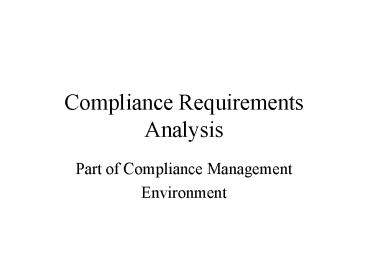Compliance Requirements Analysis - PowerPoint PPT Presentation
1 / 9
Title:
Compliance Requirements Analysis
Description:
... presentation of bill of entry has been made prior to the date of ... Date of Bill of lading/AWB: the date for determining the validity of an import license ... – PowerPoint PPT presentation
Number of Views:53
Avg rating:3.0/5.0
Title: Compliance Requirements Analysis
1
Compliance RequirementsAnalysis
- Part of Compliance Management
- Environment
2
Compliance Requirements Analysis
- There are two broad categories of compliance
requirements in import and export transactions - Revenue duties/ taxes and fees to be paidn by
the importer/exporter - Non-Revenue licenses/ quotas and other
requirements in respect of an import/export
transaction. - All compliance requirements are determined at the
level of the invoice item
3
Why Compliance Requirements Analysis?
- Compliance is the core objective customs
- Total compliance means total effectiveness.
- Compliance management requires compliance
measurement - Compliance cannot be measured until the
compliance requirements are determined reliably
and validly - Only when we study compliance requirements can we
find out how easy or difficult it is to comply. - The client has to know upfront his/her compliance
related responsibilities - If there is a logical basis for determining
compliance requirements, it can be automated. - The logic must be captured and explained to the
client and customs officers alike
4
Compliance Requirements Analysis Data to
determine compliance requirements
- There are two broad categories of compliance
requirements in import and export transactions - Revenue duties/ taxes and fees to be paidn by
the importer/exporter - Non-Revenue licenses/ quotas and other
requirements in respect of an import/export
transaction. - All compliance requirements are determined
invoice item-wise
5
Compliance Requirements Analysis Data to
determine compliance requirements
- There are significant transaction dates which
impact revenue and non revenue requirements - Date of presentation of document the relevant
date for the determination of the rate of duty
and exchange rate. - Data of entry inwards the relevant date for
determining the date of presentation when the
presentation of bill of entry has been made prior
to the date of entry inward of the conveyance. - Date of assessment the date on which goods were
assessed to duty. Interest on duty payable is
computed from this date - Date of Bill of lading/AWB the date for
determining the validity of an import license - Date of SVB registration In the case of related
party transaction, it determines the date from
which the valuation enhancement is enforced.
6
Compliance Requirements Analysis Data to
determine compliance requirements
- Revenue and non- revenue compliance requirements
are determined at the level of invoice item by - CTH- Customs tariff classification (to determine
duties of customs) - CETH- Central Excise Tariff classification(to
determine additional duties of customs) - ITC HS classification( to determine restrictions
on import and export and the nature of such
restrictions) - Other commodity classifications/ categories such
as cess schedules - While CTH, CETH and ITC HS are HS based, the
other schedules of commodity classification are
not on HS based system. - IT is a policy decision of the Government to
converge all the above systems of commodity
classifications into an 8-digit HS based system - The above schemes of commodity classification
would help the system determine rate of duty or
tariff value (for quantity based duties) - In addition to classification, the
importer/exporter can claim a notification that
alters compliance requirements determined above.
7
Compliance Requirements Analysis Data to
determine compliance requirements
- The role of Notifications
- Notification The term notification implies a
publication by the Central Government in the
Gazette that there shall be a special
dispensation in respect of certain category of
imports/exports. Such dispensation could be by
way of reductions in the rate of duty/ and easing
of import restrictions etc. - Such special dispensation may be conditional or
unconditional - Conditional Notifications often carry complex
compliance requirements that are not easy to
determine and are therefore offer the biggest
challenge. - Compliance to notification often implies
fulfillment of export obligations and would
entail fulfillment of export obligations for
claiming duty concessions. - Codification of notifications requires a proper
review
8
Non revenue/ documentary - requirements
- Could be any of the following
- Certificate of origin
- Import licenses /export quotas
- Certificates of No Objection(NOC) from certain
regulatory agencies - End-use certificates
- Test reports
- Bond/ bank guarantees
- May not be required on all cases/ invoice items
- Could be received/ registered transaction-wise or
could be maintained in the form of ledgers after
its registration
9
Schemes for determination of compliance
requirements
begin
- Tariff classification
- CTH
- CETH
- Other schedules
- Notification
Effective Tariff regime A Effective rate of
duty B Effective Tariff value
Revenue Data requirements
Importer/ exporter/ CHA Files Bell of Entry
- valuation
- Unit price - invoice item
- Currency exchange rate
- Freight code
- Freight/ insurance/landing
- Quantity UQC
Effective valuation C Computed Assessable
value D Computed tariff quantity
Not valid
Validation
Total duty A Effective rate of duty
X Computed assessable value B Effective Tariff
value X Computed tariff quantity (computed
separately for each types of duty and added)
- valuation regime
- Valuation rule claimed
- Relationship(SVB)
- NIDB recommendation
- Administrative decisions
compliance requirements analysis
Total quantity/ and or value of license/bond
BG/Quota/certificate _ (called ledgers)
- Tariff classification
- ITC-HS
- Other schedules
- Notification(s)
Non- Revenue Data requirements
Item level declared data element
Item-wise type of duty and computed duty
Item-wise ledger type -wise debit quantity/ debit
value
Non-revenue compliance requirements
Revenue compliance requirements
end































